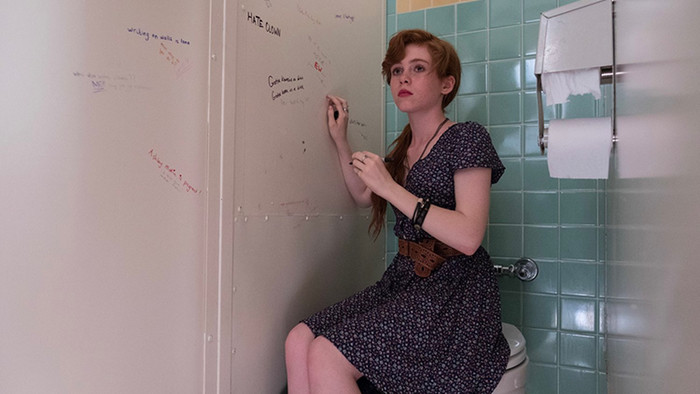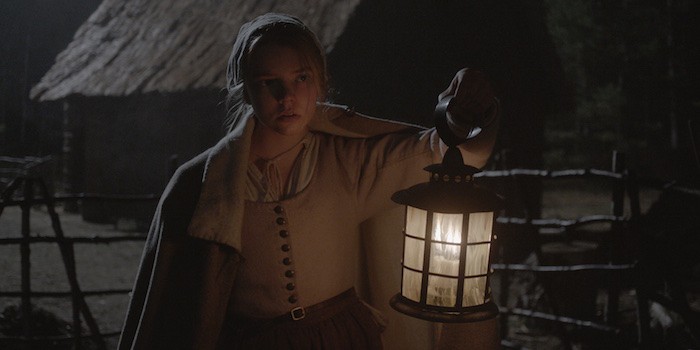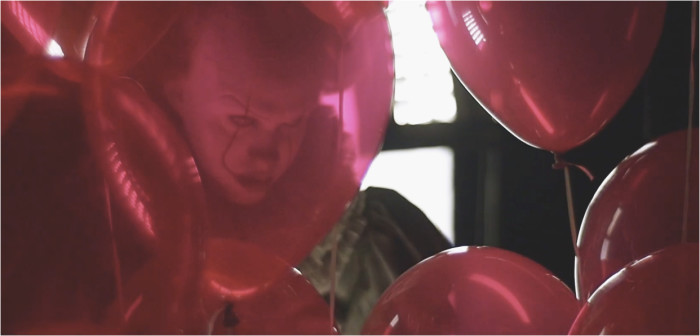A Horror Newbie Gives The Genre A Chance With 'It'
(Welcome to The Final Girl, a regular feature from someone who has steered clear of horror and is ready to finally embrace the genre that goes bump in the night. First on the list: Andy Muschietti's adaptation of the Stephen King novel, It.)
I walked into the showing of It with a feeling of dread, making my way as slowly to my seat as I could with the hopes that I could miss a few of the inevitable horror movie trailers that would precede the Stephen King adaptation. No such luck. I got a face full of a Blumhouse Studios trailer of Happy Death Day, a standard, somewhat schlocky slasher flick that fits a lot of my uneasy expectations of horror movies: ultra-violent, senseless, and sadistic.
Because you see, I'm not a huge fan of horror movies. You could go as far to say that I've tried to avoid them with my entire being — though like that bloody Happy Death Day trailer, I've had no such luck. So why was I on my way to see It, a horror movie based on a novel by one of the most infamous horror writers of the past century? Because sometime in the last few years a switch flipped and I've started to become more curious about the genre. And this felt like a good place to start.
Why I'm Horrified of Horror
It started a few years ago when the critical acclaim for It Follows and The Babadook — before the latter became a gay icon — started rolling in, lauding both of them as smart, allegorical horror films that offered more than just cheap jump scares. Intrigued by the societal metaphors that both films offered, but still too scared to load either of them on Netflix, I've kept them in the backburner of "movies I'll watch one day when I grow a spine."
For those horror fans wondering how much of a wimp I really am, I got nightmares for a week after inadvertently seeing the trailer for Lights Out, the 2016 supernatural horror film starring Teresa Palmer as a girl stalked by a terrifying figure that could only be seen when, as the title suggests, the lights are turned off. This movie, as much horror does, taps into my own skittish nature and deep, deep paranoia. I have a tendency to scare myself senseless à propos of nothing — case in point, last week I was arriving home late at night and was suddenly struck by a fear that something could be lurking in the wooded darkness near my house. You see, I never grew out of that fear you had as a kid that something might be lurking in your closet. I don't live in constant fear per se, but my mind frequently wanders to that of the unknown (I ironically have a fascination with ghost stories), thus scaring myself in the process.
So my thinking was, why give my time to films that are engineered to create these feelings of dread and terror when I can easily do it to myself?
But at some point, my fear of things that go bump in the night couldn't be the only thing keeping me from horror films. Steadily, my distaste of the genre has grown, mostly geared toward the slasher and "torture porn" films. Oh, I have a traumatizing memory to associate with this, too. It is rooted in a sophomore year pool party in which my "friends" wanted to watch the hot horror movie of the moment to wind down the time. Despite my weak protestations, the 2007 reboot of Halloween was put on, and one of the guys thought it would be funny to hold my hands away whenever I tried to cover my eyes during a particularly violent scene. It wasn't. So, wide-eyed was how I watched the lewd psychiatric ward asssault scene that introduced the murderous tendencies of Michael Myers, as the movie descended into even grosser depictions of violence and sex — especially violence against women. I couldn't fathom the laughter of my fellow partygoers during these scenes, and could fathom even less how these films were enjoyable. I would learn over the years that horror is singularly cruel to female characters, and have a tendency to dole out misogynistic narrative punishments toward women who stray outside of the strict societal expectations for them — hence the existence of the virginal "final girl" trope after which this column is named. I won't even go into the deeper implications of the brutalization of the naked female body and the often phallic weapons with which they're named.
After that terrible pool party, I swore off horror, though it was only a few years later that I would start to be more open to the genre.
The Twist
After The Babadook and It Follows piqued my interest, I couldn't shake the idea that I may have too quickly brushed off horror films. In 2015, I suddenly found myself in the audience for "horror" films like The Witch and Crimson Peak — of my own volition. I was breaking my self-imposed ban on horror movies, and I started to wonder if I was slowly becoming a horror fan.
This newfound interest could be pinpointed on the advent of low-budget, high-concept horror films like Paranormal Activity, begetting horror-thrillers like The Invitation. It could be blamed on the popular rise of socially conscious horror flicks like The Purge and Get Out. Hell, it may be all A24's fault, and their sponsorship of genre-bending, eerie horror movies like The Witch and It Comes At Night.
Or I may be more primed to like horror than I originally thought. Outside of my longstanding fascination with urban legends and ghost stories, I have a particular fondness for macabre genres that have their roots in horror: Gothic romance, sci-fi horror, noir, and fairy tales (many of which have dark roots as urban cautionary tales). It's why I would watch any Guillermo del Toro movie in a heartbeat, without any reservations about how terrifying it would get. I also found that on TV I had a slightly higher tolerance for "horror" elements, delighting in body-horror elements in sci-fi series like Fringe, becoming entranced with Hannibal, and most importantly, falling for Buffy the Vampire Slayer. The horror-camp series is easily one of my favorite shows, lending to my fascination with the "monster as metaphor" and the subversion of horror tropes. It was only a matter of time, with the new age of high-concept, allegorical horror films that we're seeing today, that this would lead to me trying to fully tackle the horror genre once and for all.
But let's talk about It now.
The First Boss
Enter It.
I had some idea of what to expect of It going in. Inundated with ads and trailers for It, I was prepared for the horrifying, stalking, creepy clown — though luckily I have no innate trauma surrounding clowns — and for a dejected, grim commentary on the dark underpinnings of suburbia. What I didn't expect was to be so charmed.
The seven kids of the Losers' Club are the emotional core of the film, brilliantly portrayed by child actors Jaeden Lieberher, Jeremy Ray Taylor, Sophia Lillis, Finn Wolfhard, Chosen Jacobs, Jack Dylan Grazer, and Wyatt Oleff. Not once does the movie waiver from keeping them at the center of the film, with the adult characters rarely getting lines and — under the influence of Pennywise — coming off as heightened versions of children's perceptions of adults: unfeeling, harsh, and uncompromising.
It remarkably balances the act of being a standard horror film within a coming-of-age story. But the two aspects of the movie are inseparable, which makes It so powerful: The film uses horror as an allegory for the shortcomings of adulthood and fears surrounding the uncertainty of growing up. Loss of innocence themes are replete throughout It, as are the odes to childhood wonder that Stephen King had perfected in "The Body" (the short story basis for Stand By Me). What astonished me was that the horror elements, rather than distracting me from the coming-of-age story, only served to invigorate a beloved genre to me. The tribulations that the Losers' Club went through as they grappled with their budding maturity and small-town apathy were only made more potent through the lens of horror.It does fall victim to some of the stumbling blocks of horror films, mainly in its treatment of Beverly, the lone female character in the Losers' Club. She is frequently defined by her feminine features — her fears with the bloody bathroom extending to her "becoming a woman" and lusted after by her own father. The implication that she was sexually abused by her father only serves the frequently and poorly used trope of having a female character's defining emotional development being informed by sexual trauma. While the infamous child sex scene from the novel was thankfully cut from the movie, Beverly is still portrayed in a singularly sexual manner — first by being the object of the boys' desires, then by that sinister flirting scene with the pharmacist. And though Beverly is the first to take a swing at Pennywise, she is also relegated to damsel in distress — a plot point, along with the creepy pharmacist scene, that was not included in the original Cary Fukunaga script. The stumbles with Beverly's character were not enough to pull me out of the movie, but it did serve to remind me that horror is a genre that still isn't explicitly made for me.
Final Thoughts
Pennywise may not be a literal "monster as metaphor" as many of the demons on Buffy the Vampire Slayer were, but It acted a perfect stepping stone for me to explore my fascination with deeper meanings behind horror tropes.
I still get little enjoyment from the actual act of being scared by films, but horror offers such a wellspring of story and commentary that I find myself being drawn more and more to the genre. And shockingly, It didn't scare me as much as I expected. While I was appropriately jumpy during the film, I wasn't left with an overwhelming sense of dread that horror films usually give me. It tapped into my own fears growing up in a suburban cul-de-sac: the dilapidated storage room in the basement, the lazy wandering around storm pipes, the uncertainty of what would happen once this childhood bubble burst.
But I still felt a strangely warm feeling of accomplishment. Perhaps because I got to see the coming-of-age movie rendered anew, or perhaps because I got through an entire horror movie without walking out (I braved it out longer than at least five people in my theater!). Maybe it's because I was finally giving a whole genre a chance, and opening up a whole new realm of stories and films that I had never before considered. I would still die before I see the Halloween reboot, though.
Next up: Hoai-Tran goes back to basics with a silent horror double feature, Frankenstein and Bride of Frankenstein.


